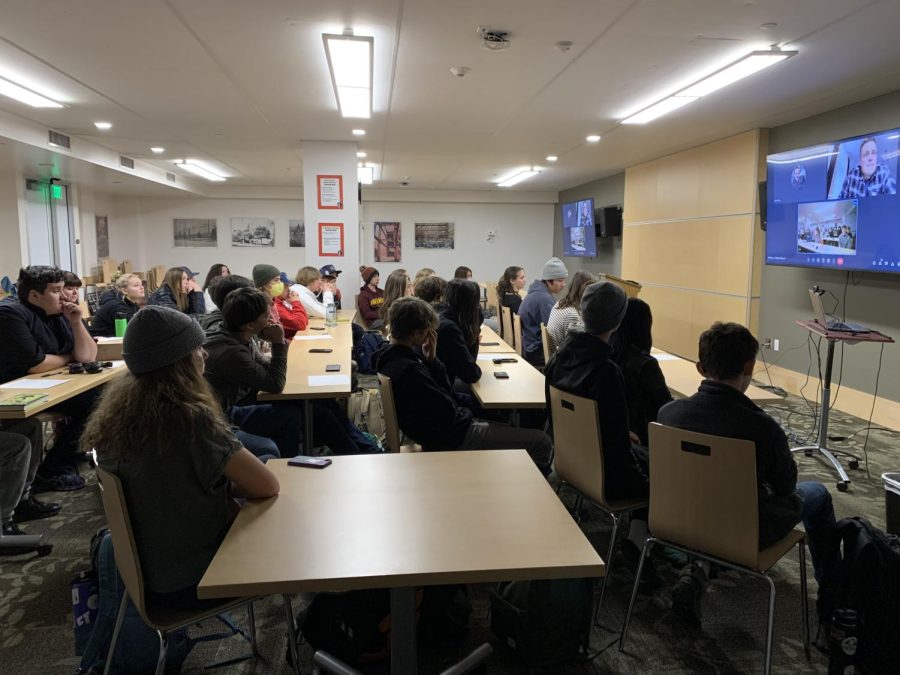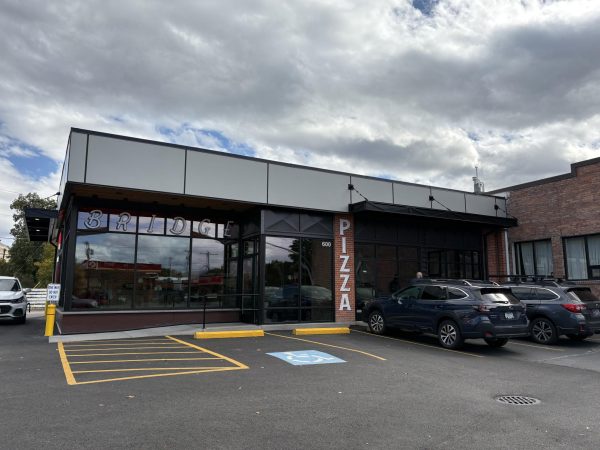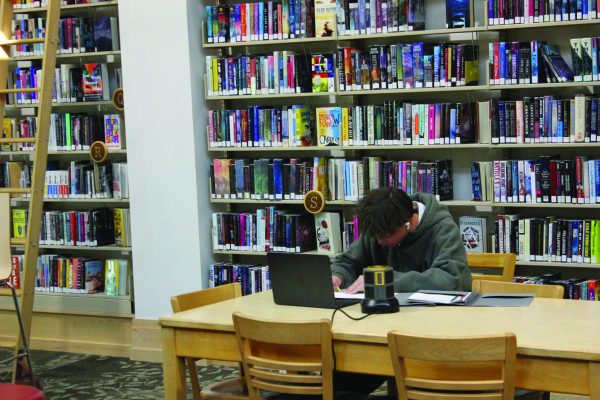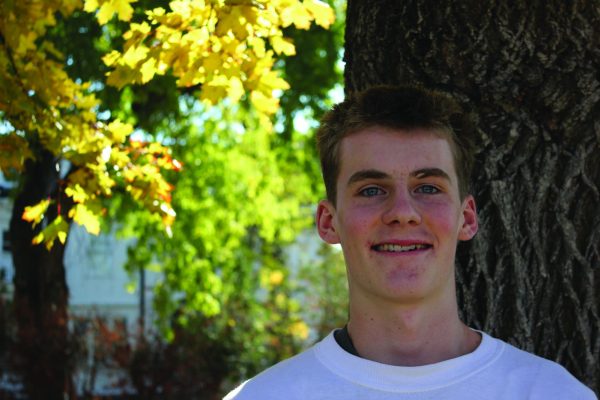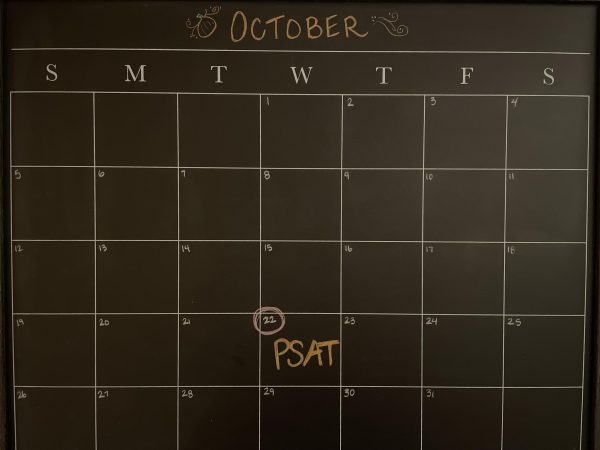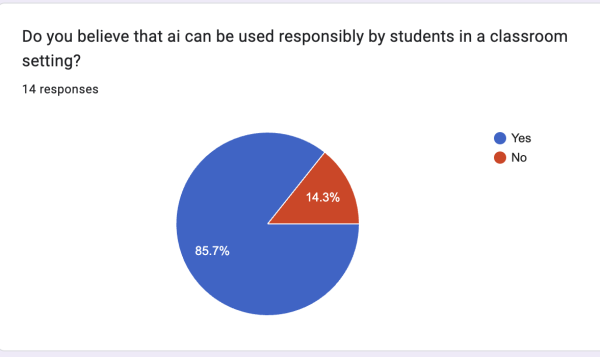Ukranian Mayor Speaks to Hellgate Students
Students attentively watch Mayor Bogdan Kelichavyi answer their questions about Ukraine.
On April 14, at the start of office hours, roughly 40 students filed into the Knight Hall. Their eyes turned to the Zoom call projected onto the screen. Minutes later, a young man wearing a dark blue t-shirt and a brown flannel sweater logged on. His blond hair was neatly combed, and his blue eyes had a determined steely gaze, the look of a weary leader.
This was a moment AP Human Geography students had been looking forward to. Teacher Velita Rholl facilitated a unique opportunity for Hellgate students: a chance to chat over Zoom with the mayor of Kopychyntsi, a small town in Ukraine.
Bogdan Kelichavyi is only 30 years old, one of the youngest mayors in the country. He is the mayor of Kopychyntsi, and he also oversees the surrounding villages with a combined population of approximately 13,500. He was elected in 2020, and has had a rough start to his political career.
“Here in Ukraine, we have war, as you may have heard. This is definitely something that I was not prepared for,” said Kelichavyi. “I started as mayor for more than one year now, and we started in the middle of COVID. There were so many restrictions and so many touch times. And then it happened that we had war, Russia attacked us.”
On February 24, Russian President Vladimir Putin ordered the launch of a military invasion into Ukraine, infamously claiming it was to “denazify” Ukraine. While many analysts predicted a swift victory for the Russians, the morale of Ukrainians, supported by dozens of foreign nations, has proved strong enough to fend them off.
As of print, the Russians are focusing on a campaign in Eastern Ukraine, in the Donbas region. The goal appears to be to capture territory to link mainland Russia with Crimea, the Ukrainian peninsula that was seized by Russia in 2014. Simultaneously, success in the east would provide Russian propagandists with material to persuade their population that the war was successful – even though many of the goals of the early stages did not come to fruition.
During the 35 minutes students could chat with Kelichavyi, Rholl acted as a moderator, asking questions students had prepared ahead of time. If students came up with a new question during the call, they could pass a sheet of paper up to her through the rows, and Rholl would ask it for them.
In response to a question a student asked about what happened when Russia first invaded, Kelichavyi reflected on the capacity of humans to adapt. “We have this tendency to adapt to everything and I feel like, this almost two months of war we’ve had with Russia right now, it’s like a separate mind because it was very intense,” he said. “In the beginning, everybody was so scared. We didn’t expect that, we didn’t know what to do. It was really hard to get some sleep.”
“The situation on the front lines, of course, like it’s scary. You have scary pictures from different parts of Ukraine. We expect to have a big war right now, part of the war rumors, but here locally, we just tried to, you know, protect ourselves, emotionally, psychologically, so we’re trying to get together as much as we can,” said Kelichavyi. “We do some meetings together, we are having some barbecues together, but of course, when we have alarms, meaning that rockets fly over us, then it means we should stop. We should go to shelters.”
Kelichavyi explained that many of the citizens of his town are learning to accept this as their new reality. “We are trying to create some order now, but then after some time we received a lot of internally displaced people. And we became friends. We started launching projects together.”
Since the war started, they have taken in about 1500 internally displaced people (IDP). These are similar to refugees; however, IDPs are people displaced within their home nation, they didn’t leave the country’s borders.
With limited resources, the town has transformed their schools into temporary housing places for IDPs. “We started housing refugees in the kindergarten because we didn’t have beds yet. In kindergarten we have these tiny small mats. So if you put three mats together, it becomes like a whole bed,” said Kelichavyi.
“And then we started using School #1. We have different schooling system here… in our town, our central town, we have School #1 and School #2, those are separate buildings. So in School #1, we have refugees now. Most of them are in the halls, and also in the classrooms,” he said. “We are getting prepared to host more, so we are preparing our School #2 and this time we want to be ready more. We already got some mattresses, we already got some blankets, we’re constructing new mats. We are also installing more shower rooms there, washing machines, laundry, you know all these things that people would need.”
Kelichavyi has a lot of responsibility, but he’s delegating some work to his 26 council members, and the citizens of Kopychyntsi have stepped up. “Of course we were not prepared for war, we were not preparing for it,” he said.
His role isn’t without danger. “Mayors have been kidnapped. Even some of my friends,” he said. “We don’t have cases where mayors were kidnapped in the western part of Ukraine. But we’re trying to protect ourselves as much as possible. We also created our local defense unions that are protecting the city and protecting us, our entrances and exits from the town are also blocked. And we are controlling who is coming in and out, physically trying to be protected and just trying to do our job. So of course I feel scared a bit, but I’m just trying to do my part of the war.”
The violence has hit close to home. “I mean, my brother is here with me. He lives in the suburbs of Kiev. Just imagine that you live in your town, that you live in a house, and then a rocket flies. You were living on the sixth floor and the rocket came to the 13th floor. And that’s it. A lot of the apartments are destroyed… You were saving money to buy this apartment, your life is around it, and now it’s dangerous to go there,” he said. “It was totally dangerous to stay there. I’m glad that his family moved here on the first day of war. So these are totally not normal things that are happening here.”
Towards the end of the call, Rholl relayed a question from her students: Why did he agree to speak with them? Doesn’t he have better things to do? Kelichavyi answered that he feels like this is his calling, the best thing he can do to help right now is to share the word about the horrors of the war. He wants people in the West to understand their perspective.
“We don’t have so many English speaking mayors in Ukraine. And I felt like this is a good opportunity to present what’s going on here because I remember from history that we have another genocide in Ukraine, in the 1930s, when the Russians killed millions of Ukrainians and nobody knew about that in Western media,” said Kelichavyi. “So I felt like, okay, this is also part of the war. If I cannot be on the front lines, because I’m responsible for my people, this would be another front line. This would be the opportunity to talk publicly about what’s been going on here.”
“Of course, I cannot say everything because there are some military things here, like information that I cannot share, but regarding everything else, like how people feel, what do they feel, and just to show everybody that we are normal, we are like everybody else, we have same veins, we have same dreams, we have the same relationships here. And it’s important that everybody else can understand that, and to show that we didn’t want this war. But we also don’t want to give up our land. We just want to live normally,” he said.
Kelichavyi has spoken with a wide assortment of media outlets, TV stations, nonprofits and education groups, and he’s hoping for more opportunities to speak to Americans. “I’m also trying to promote my town, I’m trying to promote my country, my region, and all the activities that we are doing. Sometimes people donate to us and tell us to scale up and help many more people,” said Kelichavyi. “I know my colleagues, mayors who cannot do anything because they are occupied, they are very close to the front lines. So I feel the responsibility for others.”

Just a girl who fell in love with journalism and never looked back. This is my third year with the Lance and my second year as Co-Editor. I also play soccer...

